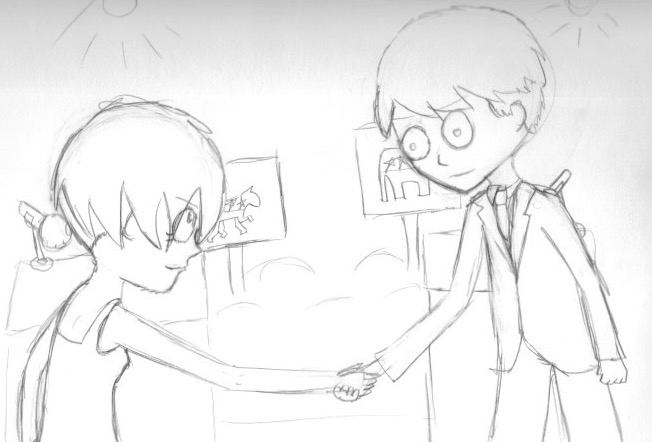To be a contrarian is to disagree with the majority consensus on principle — no matter how criticized that position might be.
When I began actively studying logic, I was amazed with its simplistic deductions and validity and how much stupid bullshit I had previously believed in. I came from a liberal upbringing, trained to despise the conservative right. As I examined the soundness of my preconceptions, both the rhetoric of the right and the left became disillusionary, pushing me toward political independence.
It was too frustrating to watch echo chamber compete with echo chamber, each imposing restrictions on the other, each trying to control bodies, property and freedom. The only topic I used to debate on was religion, but I found myself arguing for abstract liberties, individualism, progressivism and massive-scale structural reform.
Disagreeing with conventional wisdom can help people question their role in sweeping cultural trends. You don’t have to commercialize to a professional provocateur to incite controversy. You just have to learn to debate unfavorable sides.
When the general public attempts to develop their philosophies from aggregate media, it will always end in woefully inadequate ideology. But iconoclasm, in this effort, is a lot more progressive than skepticism, which is more like useless social undermining leading to nihilism.
A place where contrarianism has been bountiful is the history of science. Whenever we’ve witnessed a paradigm shift, it has been accompanied by radical science that upturned the previous template and demanded new perspectives and methodologies. Galileo, Newton, Lavoisier and Einstein all had to dismiss the “right way” to do things that led to such wonderful discoveries in the global community.
There is, however, a lot of bad contrarianism. Much of the new-new atheism acts as such. Atheism has opened itself up to substantial attack on the basis of being overly elitist. There’s that abominable section of the blogosphere where militant atheism lives, either endlessly overplayed in sophomoric YouTube videos or recited by hipsters.
Atheism used to be a brothership. It has always been the minority. It was like a network. After learning someone was an atheist, you could instantly be at ease feeling a human, subastral bond.
Now the more likely place to see atheists is writing poorly-coordinated articles in college newspapers throwing in shady jabs at religion under the guise of criticizing their own nonreligious affiliation.
To compare the contemporary militant atheism with the articulate wave of the early 21st century, we need only look to the New Atheists. The celebritized New Atheists (Christopher Hitchens, Richard Dawkins, Sam Harris and Daniel Dennett) brought the secular argument to public access.
Christopher Hitchens was a great orator. He was witty with language and argumentation. The people who frequently allude to him are not so much in this way. The great contrarians have mostly been processed into cheap lube for the furious ego masturbation of bitter young adults.
Just like reading a few lines of Nietzsche prompts endless hipsters to glamorize insanity, watching a couple Hitchens debates prompts wave after wave of uncomposed antagonists to don the anti-theist label and just generally go around shitting on the religious.
It’s not cool just because it’s outside the status quo. Weeaboos, too, are outside the status quo. And weeaboos are the biggest embarrassment to human society since some Arab dude thought he was the son of a great bearded guy in the sky.
In modern society many people are atheists without ever thinking about it. Part of me is relieved, but another part understands that this is as bad as being raised from birth to believe in a deity: no free thought, no rebellion, no moment of revelation. No “aha” moment.
Even with atheism partially hijacked by edgy man-children, it’s still one of the best starting points for contrarianism, depending on where you live.
Contrarianism isn’t just being a devil’s advocate, a device for exposing stronghold positions to alternate opinions. Devil’s advocate is so overused it’s become meaningless.
Neither does contrarianism collapse to hipsterism, which is just being different for the sake of being different or special. Contrarianism is Socratic progress in dialogue.
William Rein can be reached at [email protected] or @toeshd on Twitter.










Ian Cooper // May 6, 2016 at 5:16 pm
Funny how atheism’s detractors always try to make out that there’s some kind of nasty radical fringe. “New Atheism” is the latest effort to do that. Strange that 50 years ago, Madalyn Murray O’Hair was doing exactly what today’s “New Atheists” are doing, perhaps even more vociferously. I’m guessing that two millennia ago, Epicurus had the same criticism leveled at him – suggesting that he was one of the “bad atheists”. Bad atheists, it seems, are those who don’t keep their mouths shut in the face of religious oppression.
William Rein // May 7, 2016 at 11:14 am
I think the difference is that “New Atheism” has actually been embraced by a lot of atheists, as a nonderogatory term. In addition, religious “oppression” is hardly what it used to be. The religious are the ones in power globally, yes, but that doesn’t amount to oppression. I don’t feel oppressed as an atheist simply because we’re less represented. The scientific community will always be there.
And Epicurus was around before globalization. Now, it’s possible for reasonable pluralism, and many culutures and religions to live together. I suggest it’s time we stop being assholes about everything.